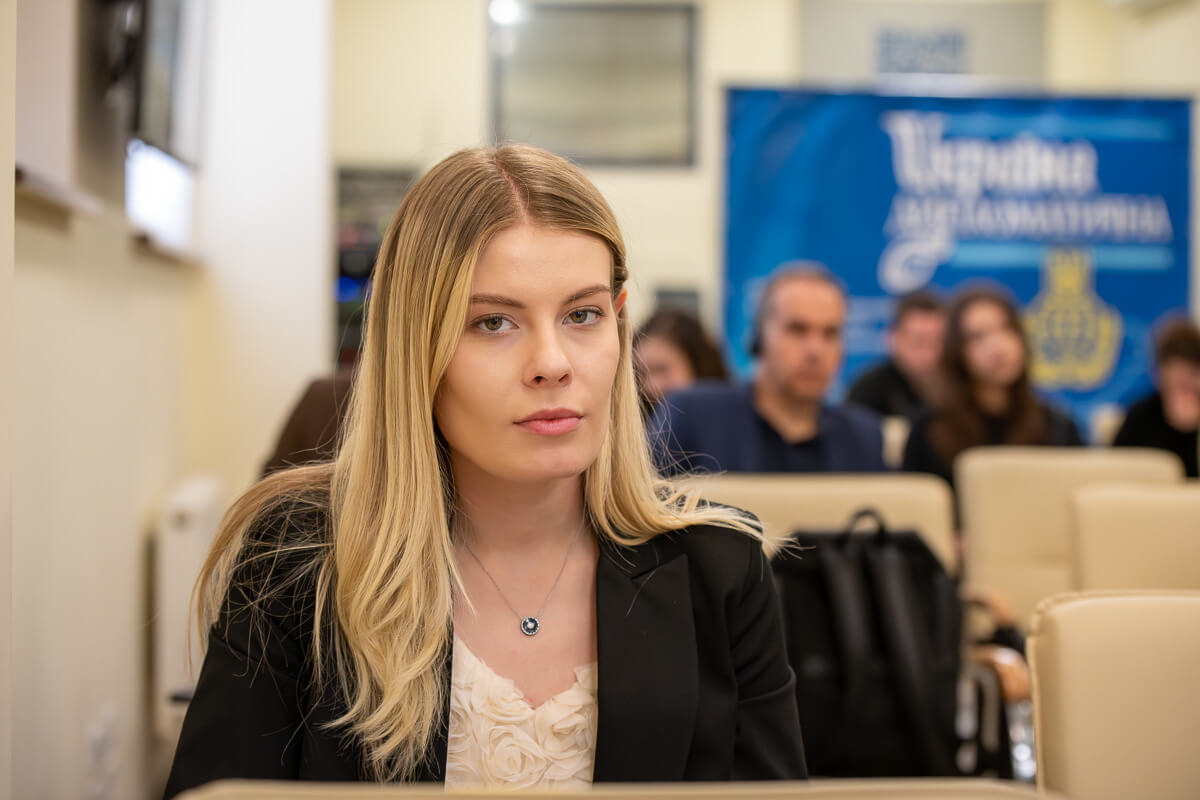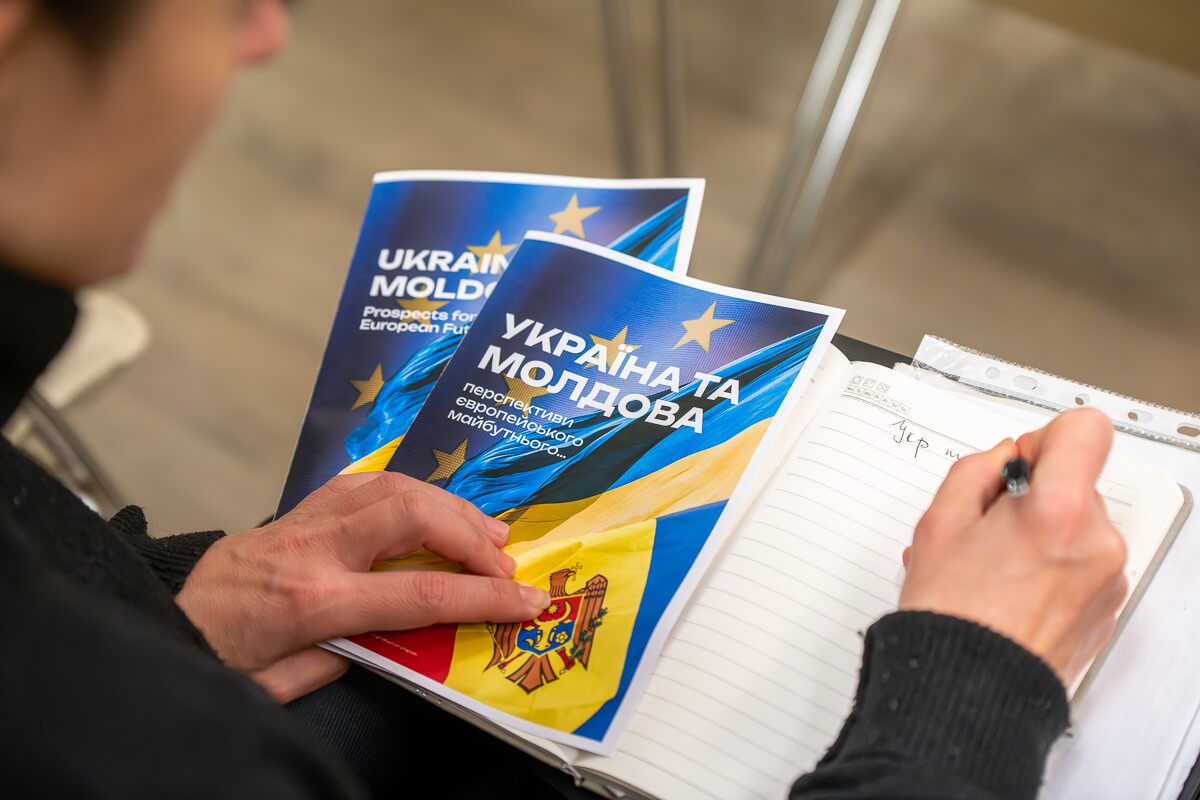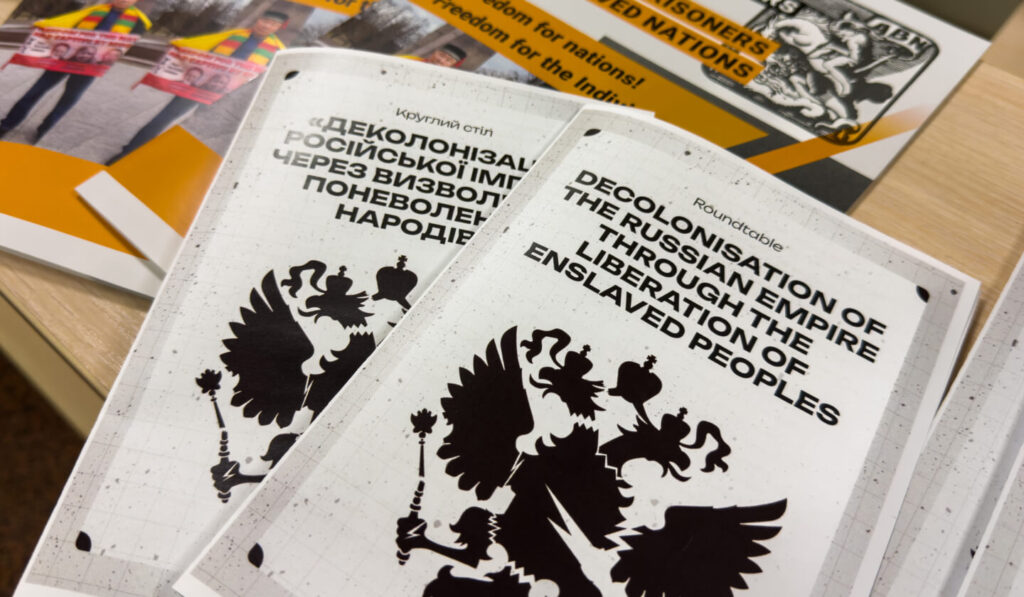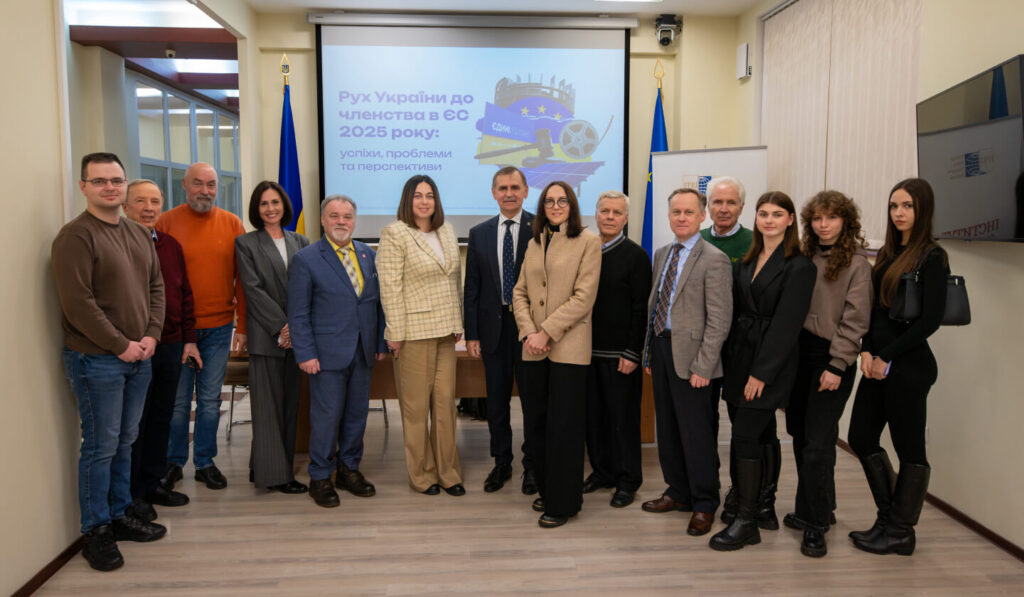On Wednesday, 1 October 2025, the Institute of World Policy, together with the non-governmental organisations Ukrainian Center of Peacebuilding and the Institute of Democratisation and Development, with the organisational support of the State Enterprise ‘Directorate-General for Rendering Services to Diplomatic Missions’ (GDIP), held a roundtable discussion titled Ukraine and Moldova: Prospects for a European Future at the GDIP Media Center. The event was a follow-up to the earlier round table Parliamentary Elections in the Republic of Moldova — the Ukrainian Context.
The roundtable brought together representatives of the foreign and domestic diplomatic corps, Ukrainian media, higher education institutions, and the expert community.
The event was moderated by Yevhen Mahda, Director of the Institute of World Policy. In his opening remarks, he highlighted the relevance of the roundtable discussion, where experts aimed to analyse the course and results of the parliamentary elections in Moldova, explore instruments for countering russian influence, and forecast scenarios for Ukraine–Moldova cooperation in resisting russian pressure on the path toward further European integration.

Among the speakers were Vadym Halaichuk, member of Parliament of Ukraine, first deputy chair of the Verkhovna Rada Committee on Ukraine’s Integration into the European Union; Marianna Prysiazhniuk, political analyst at the Ilko Kucheriv Democratic Initiatives Foundation; Mihai Isac, editor-in-chief of Karadeniz Press and journalist at TVR Moldova; Vitalii Kulyk, Head of the Educational and Research Laboratory for Countering Disinformation at Vadym Hetman Kyiv National Economic University; Dmytro Lekartsev, Head of the National Congress of Ukrainians of Moldova; Borys Babin, expert of the Association for the Reintegration of Crimea; and Nazar Mukhachov, journalist and editor-in-chief of the US-based Ukrainian-language Surma newspaper.
During the event, experts engaged in an in-depth discussion of the results of the parliamentary elections in Moldova and russia’s attempts to interfere in the electoral process by violating international law in order to undermine the free will of the voters. The participants also addressed security challenges in the Black Sea region, which, since the military annexation of Crimea, have become a fundamental military threat to the region and several NATO member states, including Romania and Bulgaria. Furthermore, the discussion highlighted Ukraine’s readiness to continue constructive dialogue and to strengthen friendly, partnership-based relations with Moldova in the context of negotiations on accession to the European Union.
Speaking about the success of the parliamentary elections in Moldova and the permanent threat of russian attempts to destabilise the newly elected government, Vadym Halaichuk noted:
‘Russia engaged in large-scale hybrid influence, manifested in the illegal financing of various pro-russian political forces. However, in the course of an extremely intense information campaign, these efforts were successfully neutralised. Yet there is no doubt that russia will continue to actively seek to exert hybrid influence, exploiting domestic sentiments as well as economic and financial levers, which, unfortunately, it still possesses in abundance, in order to attempt to destabilise the work of the newly elected parliament and government.’
The expert further stressed that Ukraine and Moldova are moving in parallel along a pro-European course, making it vital not to deviate from this path and to resist russia’s attempts to undermine it:
‘We continue to work with Moldova, with its authorities, society, and expert community to coordinate our actions and to provide maximum support so that Moldova can withstand this pressure, and so that our cooperation and common integration trajectory are not interrupted.’
Marianna Prysiazhniuk commented on the destructive influence of russian forces on the Moldovan elections from a sociological perspective and stressed that a significant factor in the electoral process is the mandatory engagement with one’s citizens abroad. For this reason, she argued, Ukraine should take into account the example of Moldova or Romania, while also recognising the potential risks associated with these votes.
‘I believe that the risks of russian interference are underestimated in Moldova. I do not share the narratives of Moldova’s supposed triumph over russia, for there remains a certain indulgence towards the idea of ‘good russians’ and towards softer forms of influence. The real issue is that there is no visible political force to serve as a successor to pursue a democratic course in case ruling party loses support. Secondly, the overall agenda between Ukraine and Moldova remains extremely heated.’
Mihai Isac drew attention to the lack of serious commitment from pro-European parties to dismantling the ‘pro-russian monolith’ in Moldova’s regions, the European aspirations of Moldovan diaspora communities abroad, and the polarisation of Moldovan society:
‘Today, Gagauzia and the diaspora act as compasses pointing to the country’s directions of development. They remind us that the Republic of Moldova remains divided — both culturally and geopolitically. As is well known, Gagauzia maintains special relations with Transnistria, which remains under unlawful russian military occupation. Moldovan security services have taken rigorous steps to prevent Transnistrian residents from travelling into Moldova to participate in public unrest. Our police have arrested dozens of individuals with ties to Gagauzia and Transnistria (many of them with criminal records), who are being paid to perform roles similar to those of titushky in Ukraine. Sadly, there is no simple way to bring Gagauzia back from under russia’s influence, and regrettably the russian Orthodox Church is also engaged in this struggle against Moldova. The Republic of Moldova lacks initiatives comparable to those in Ukraine that would attempt to consolidate an alternative Orthodox identity beyond the russian Orthodox Church.’

Vitalii Kulyk provided an analytical assessment of the measures taken to counter russian influence during Moldova’s parliamentary elections, describing them as indisputable evidence that mechanisms and algorithms already exist to resist the russian construct seeking to take root in other countries. The expert cautioned, however, that even after the victory of pro-European forces, the threat from the Transnistrian region remains very real:
‘We should not forget about the danger emanating from Transnistria. There are information hubs there that manage well-known Telegram channels, serving as russian propaganda outlets. Groups based in the region issued threats or carried out sabotage operations against Ukraine in 2014 and 2022. Campaigns to inspire separatist ideas of a so-called Bessarabian Republic also originated in Transnistria. The region likewise hosts military assets that russia could potentially deploy, which is why this threat cannot be ignored. The matter requires a separate response from policymakers with regard to assessing risks from Transnistria. […] Overall, we welcome the victory of the Party of Action and Solidarity as a victory for Moldova’s European choice. At the same time, political elites in other countries — including Ukraine — may be tempted to apply some of the same techniques used to counter pro-russian projects: the criminalisation of opposition, special electoral legislation, or ‘manual’ justice.’
Dmytro Lekartsev emphasised the historic significance of the parliamentary election results for Moldova’s development as a country on a pro-European path:
‘The Moldovan people have probably taken the most important decision in our history. Yes, the outcome was striking, and we are very pleased. We are glad to remain on the European course, to see political stability in Moldova, and to know that the Moldovan people have chosen to move forward. This is, above all, a victory not of the ruling party but of the Moldovan people, and we all hope that just as lessons have been learnt in countering russian interference, lessons will also be drawn in terms of working with the national minorities of the Republic of Moldova, including Ukrainians. The vote has taken place. You saw how it went in the North, in the South, in Transnistria — the areas with the strongest pro-russian electorate. At the same time, it is noteworthy that Ukrainians in northern Moldova delivered fairly good results for the Party of Action and Solidarity, which shows that many of them, too, seek stability and European development for our country.’
Speaking about the parallels between russian destabilisation in Crimea and in Gagauzia, Borys Babin stressed that Moldova is an important partner for Ukraine, one with which cooperation must be built to counter russian designs collectively, to engage with electoral masses and to defend sovereignty:
‘Today, under the conditions of russia’s full-scale aggression, Moldova’s logistical significance for Ukraine is fundamental. Naturally, there are challenges: activity involving the Danube River system, the railways and other logistical links can accelerate both our joint interaction and our shared European integration. […] At last, we have turned our attention to Moldova (something we regrettably failed to do for decades), as to a major partner, ally and economic counterpart. On the basis of such cooperation in fundamental spheres — what used to be called the national economy — I believe further humanitarian interaction will crystallise, altering for the better the situation in electoral positions, in security risks and in challenges that affect not only the territories of Ukraine and Moldova occupied by russia, but also those under the authority of the Chişinău government.’
In his remarks, Nazar Mukhachov drew attention to the underlying causes of societal division that russian propaganda exploits with references to traditional values, and suggested considering Ukraine’s further European development not necessarily through EU accession, but rather, conditionally, through membership of a Black Sea Confederation as a way to counter russian influence:
‘In the event of a possible formation of a Baltic–Black Sea Confederation in partnership with the Scandinavians and the United Kingdom as a strong geopolitical player, one could indeed speak of maintaining the same pro-Western political course and depriving moscow’s propaganda of many of the trump cards on which it speculates and feeds. The very prospect of creating such a union is of immense importance. Within the framework of mass consciousness and the ideological divide — above all between the ideology of the “russian world” and that of the so-called open society — this could provide the chance to shape something closer to the people and more responsive to their interests.’
The experts’ speeches were followed by a lively discussion involving participants from the audience.










